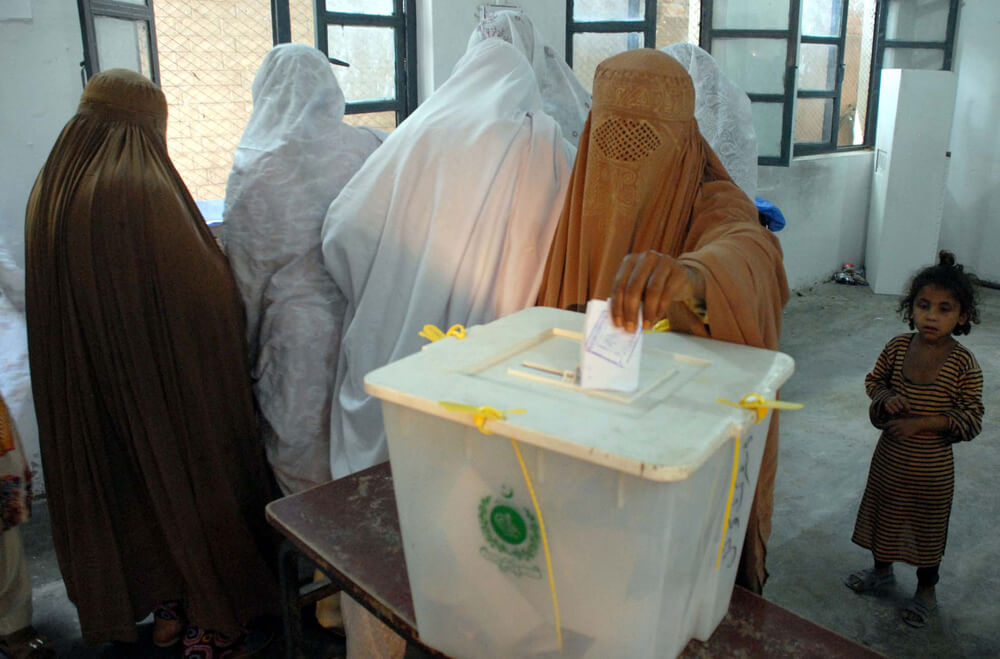None of the options Pakistan faces after the parliamentary elections give hope that the country will get through them without a significant political crisis.
The cards have been dealt, giving the 2 polarised blocs equal but diminished prospects of forming a government -one formed with plenty of suffering and compromise.
Whichever option emerges victorious and establishes a government first will only have an easier task compared to what the full mandate entails. A lack of legitimacy, for example, to implement more significant economic and political changes will be an insurmountable obstacle for any future government.
The military establishment, which has ruled Pakistan since its founding 76 years ago, has done everything to avoid the blow it received in last Thursday's election.
Former Prime Minister Imran Khan's option won the largest number of parliament seats, even though its candidates are still far from the majority required to form a government.
Mr Khan's Pakistan Movement for Justice (Pakistan Tehreek-e-Insaf - PTI) has been banned from participating in the elections, and Mr Khan has been in prison since last August.
However, his supporters won 92 mandates as independent candidates, more than all the others, but still far from the 134 seats, which is the majority necessary to form a government.
Repression was not efficient
The repressive measures to nullify the impact of Mr Khan's option were not enough. Neither was the fact that he was arrested on serious charges or that his party was banned from the elections.
It was not enough that mobile Internet and phone lines were cut off on the day of the elections, which should have hindered the control of voting regularity and communication between Khan's supporters.
Given the numerous objections to the regularity of voting, the authorities will continue blacking out Internet communications, which they resort to more often, despite objections from companies whose businesses have been seriously threatened. However, the stakes are much higher for the military establishment.
The biggest problem for Pakistan's military-political dynasties occurred during the last elections in cyberspace
The biggest problem for Pakistan's military-political dynasties occurred during the last elections in cyberspace.
The ossified establishment based its control over information through influencing the mainstream media. However, the Internet and social media remained dangerous zones that the establishment could not suspend.
The principal part of the opponent's campaign went precisely through those channels, and activists even shared speeches and addresses of Mr Khan changed by using AI so that voters would get the impression that the former prime minister addressed them personally.
Ignoring the voice of the youth
In this respect, the Pakistani authorities also ignored the fact that a significant part of the electorate, as much as 45%, is made up of young people. Pakistan is one of the youngest nations in the world. The median age is 19, and people over 65 are only about 3.5% of the 240 million citizens living in Pakistan.
The young voters, combined with the digital means of communication close to them, brought a big electoral surprise and a big slap in the face to the establishment.
The authorities responded to their large numbers, desire for change, orientation to alternative channels for information, and their high concentration in urban centres with outdated methods.
The challenge they faced in the February 8 election was a completely new experience, for which the establishment seems to have no answer
Those methods have brought success so far, almost always with the use of political and police repression. However, the challenge they faced in the February 8 election was a completely new experience, for which the establishment seems to have no answer.
The ruling structure has a chance to remain in power and form a government in the next 3 weeks - the deadline for the constitution of the parliament and the procedure for electing the government.
Status quo - the source of an even greater crisis
There seems to be a block of slightly more than 130 seats in the parliament forming around former Prime Minister Nawaz Sharif. This is still insufficient for a majority but relatively close to the goal conditioned on attracting a few smaller parties.
The prospect of forming a government in this way is real, even though it will cost the ruling structure significant concessions - through "payment" in the division of local governments in some provinces.

Will the traditional establishment be able to recognise the change that took place in the country at the elections last Thursday?
However, such a government will only be a source of new turbulence in Pakistan, not a factor in their resolution.
Behind it will stand a fragile legitimacy and a barely gathered parliamentary majority of diverse interest groups.
Against them will stand a homogeneous and strong opposition, encouraged by the good election result and angry at the repression of the establishment and its inability to solve problems in the economy.
Will the traditional establishment be able to recognise the change that took place in the country at the elections last Thursday?
Given the first post-election moves, it does not seem ready to face that change. It will seek to sustain itself through the conventional political manoeuvres it knows well, including blackmail, trade and repression.
It is a sure way to deepen the gap between a disgruntled significant part of the population and an establishment unwilling to change.